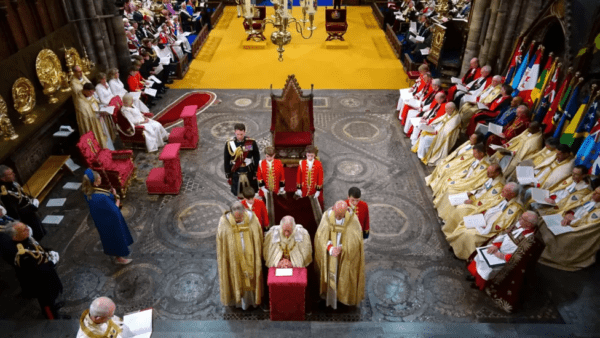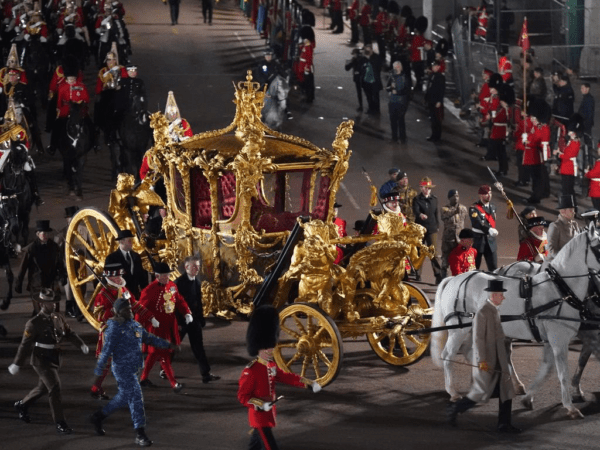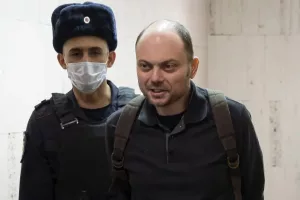On May 6th, thousands of people flooded the streets of London and millions tuned in from home to witness the coronation of King Charles III. The ceremony was held at Westminster Abbey, being the 40th coronation of a monarch there since the eleventh century. Over 2200 guests, including many world leaders and former British politicians, were present.
Many international royals showed up to the ceremony, such as King Felipe and Queen Letizia of Spain, Crown Prince Fumihito and Crown Princess Kiko of Japan, King Phillipe and Queen Mathilde of Belgium, and others. Other world leaders made an appearance too, such as First Lady Jill Biden, Emmanuel Macron, and Justin Trudeau. Former British Prime Ministers were there as well, with Liz Truss showing up with Teresa May, David Cameron, and the rest. Current Prime Minister Rishi Sunak gave a reading at the coronation.

The ceremony began at 11:00 with King Charles being presented to the people to be proclaimed the “undoubted king”. The Coronation Oath was then administered, and Charles placed his hand on the Holy Gospels pledging to keep the oath and perform all of his duties as the monarch. Furthermore, he took the Accession Declaration Oath, solidifying his claim of being a “faithful Protestant”. Afterward, he removed his ceremonial robe and took his place in St Edward’s Chair in order to be anointed.
Special oil was poured from the Ampulla on the Coronation Spoon and the King was anointed in the shape of a cross on his head. The oil used for this part of the ceremony was extracted from olives harvested on the Mount of Olives in Jerusalem and holds great religious significance. Then, the King was given the Supertunica – a golden coat – and the Sovereign’s Orb, the Coronation Ring, the Sovereign’s Sceptre with Cross, and the Sovereign’s Sceptre with Dove. Finally, at 12:01, the Archbishop of Canterbury placed St. Edward’s Crown on King Charles’ head. The abbey bells rang for two minutes, accompanied by trumpets and gun salutes in honor of the special moment. At the Tower of London, a 62-round salute was fired, and 21-round salutes were fired at eleven other locations throughout the United Kingdom, such as Edinburgh, Cardiff, and Belfast.
King Charles then took his throne and Prince William, the new Prince of Wales, paid homage to him. Queen Camilla was crowned with Queen Mary’s Crown and enthroned next to him shortly after without needing to take an oath. After the King and Queen were both enthroned, they took Holy Communion and subsequently joined the procession moving through the streets towards Buckingham Palace. The procession was divided into carriages with the closest members of the Royal Family in the first carriage behind the King and Queen, and slightly more distant relatives just behind. The Ministry of Defense of the United Kingdom called the procession the “largest ceremonial operation of its kind for a generation” and employed nearly 4000 members of the country’s armed forces to ensure the safety of all those present.

The monarchs reached Buckingham Palace at 13:30 and one hour later greeted the people from the balcony. The ceremony ended with a fly-past, with helicopters and the Red Arrows display team overlooking the city. After the entire ceremony was complete, VIP events were held at Windsor Castle including private dinners and a concert featuring Katy Perry, Lionel Richie, and Andrea Bocelli among other artists. Overall, the atmosphere throughout the day was proud and emotional, and many Britons expressed their support out loud for the new monarch.
Moving forward, one may assume that the coronation of the new king will invite consequences that will ripple through the entirety of the United Kingdom and its member states, and even wider, affecting the rest of the Commonwealth. Taking the throne after Queen Elizabeth is a grueling task, and opinion polls have shown that King Charles has significantly less confidence from the general public than his mother did, and even less than his son, Prince William. There has even been a suggestion for Prince William to be the Queen’s direct successor, “skipping” Charles, but that was always unlikely to materialize. This weakened support has brought up the question of whether or not the British monarchy will lose authority. With Scotland’s independence hanging in the balance and a potential push for a reunification of Northern Ireland with the rest of the island not being unrealistic, this could prove to be of vital importance in British geopolitics. Only time will tell whether the new king will live up to the success of rulers prior to him and whether the British monarchy will remain as influential as before.




